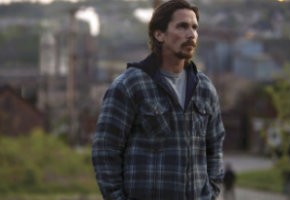Leading man

In this year’s holiday movie blitz, a live wire unites two very different films in the person of Christian Bale, who plays the lead in Scott Cooper’s Out of the Furnace and in David O. Russell’s American Hustle. Bale’s physical presence weaves his two roles into a larger narrative about masculine anxieties and hopes.
In Out of the Furnace Bale plays Russell Baze, a modest, hardworking man in the Rust Belt of Pennsylvania. The movie is set in the very recent past (an early scene occurs on the eve of Obama’s 2008 election), with the economic recession bristling below the surface. The steel mill where Russell works (and his father and his father’s father before him) is about to close. His brother, Rodney (Casey Affleck), has served five tours in Iraq and Afghanistan and bears the scars of war on his body and mind. He has resorted to bare-knuckle boxing both for money and to find an outlet for his rage. Their father, with little access to health care, is dying slowly in their childhood home.
While the wars hang over the Baze men and references are made to overseas outsourcing and the bum economy, this is not a political movie. Baze’s enemy is not the economic and political forces hemming him in. It’s Harlan DeGroat (Woody Harrelson), a meth-dealing boxing impresario who rules a backwoods underground in the mountains of New Jersey. The choice to pit Baze against a specific bad guy reduces the movie somewhat; we’ve seen this story in various guises many times before. But it also gives the film a steady focus: it is unabashedly about white working-class men and the now dying honor of their stoicism.





